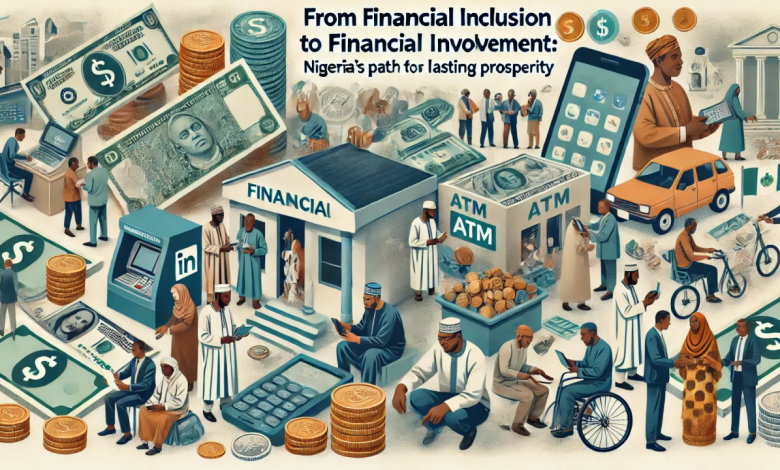
A petty trader, Mrs Mary Okunrinnla, in September 2024, downloaded one of the Fintech apps for the first time to enhance her business transaction.
Before being financially included in the banking system, Aunty Mary, as she’s fondly called in her shop, directs customers to use Point on Sales (PoS) Agents or bring cash whenever they patronize her.
“The stress of getting my money from other people whom my customers paid to have gone. Sometimes, some people I use their accounts to collect my money wouldn’t even give me on time.
“But now I have my income safely kept in my account and I can withdraw it any time. I don’t need to wait for a third party to operate my business.” Okunrinnla said.
This is one of many Nigerians ripping benefits from the Nigerian Financial Inclusion Strategy (NFIS) drive of the Federal Government.
According to reports Fintech has contributed significantly to reducing the numbers of unbanked people in Nigeria.
A Financial Consultant, Mr Tunji Adepeju, said the government and the relevant agencies have been doing quite well in making sure that people, even in the rural areas particularly, have access to banking or financial services.
“At least one will remember, even when we talk about community banks of those days.
“Now, we have these other banks that are located virtually in every segment of the country.
“We also have NIRSAL, that is the one sponsored by the central bank, with the co-operation of the NIPOST, that is they are using the offices of NIPOST in all rural communities to render financial services to people around there,” Adepeju said.
According to him, the most recent introduction in the ongoing efforts to reduce financially excluded people is the USSD which allows anyone with feature phones to transfer and receive money.
USSD stands for Unstructured Supplementary Service Data. This is a protocol that allows a phone to communicate with a mobile network operator’s computer in real-time.
USSD is often used for banking, education, and other interactive services.
According to reports, in 2023, 74 percent of Nigerians are financially included, while 26 percent are still financially excluded.
This is an improvement from the year 2020 when 67 percent of Nigerians were financially included.
In the first half of 2024, Nigerians sent N2.19 trillion using USSD codes, a significant improvement from what it was in 2022, whereby Nigerians processed 515 million USSD transactions.
Adepeju said virtually everybody who has a phone can make transfers, and check their account balances through their phones without even visiting any banking premises.
“Incentives to farmers during the time of Dr. Akinwumi Adesina as Minister of Agriculture before he moved to African Development Bank, farmers got fertilizers and other inputs through the use of phones and shortcodes like the USSD,” he said.
He, however, noted that financial services providers and deposit money banks in particular as well as other financial institutions have to improve their services to Nigerians.
Adepeju said especially in the areas of excellent and quality services and experience.
He also stressed the need for Nigerians who may still be unbanked to embrace change.
Also, another Financial expert, Mr Sola Famakinwa said financial inclusion means individuals and businesses have access to financial products and services that meet their needs.
According to him, financial inclusion is an enabler towards achieving sustainable development goals and reducing extreme poverty as well as the digital transformation of Nigeria.
Famakinwa said the government needs to strengthen its monetary policy so as to increase the number of people and businesses that participate in formal digital financial services.
He lauded the NFIS goal set of reducing financial exclusion by 25 percent, urging the government to work on the interest rates and other policies.
Another expert, a Treasury Accountant, Mrs Pelumi Ukot, said financial inclusion is the provision of financial services to all individuals and businesses, regardless of their income level, geographic location, or social status.
According to her, the aim is to ensure that everyone has access to basic digitized financial services, such as Savings accounts, Credit facilities, Payment systems, Insurance services, and Investment opportunities.
Ukot said financial inclusion has been key to digital transformation and could help tackle poverty and inequality.
“Other benefits include the promotion of economic growth and development, increasing financial stability and security.
“It would enhance access to basic services, such as healthcare and education as well as birth creativity and innovations premised on digital transformation.
“This would help empower individuals and communities to participate in the economy and contribute significantly to the technological development of Nigeria and help evenly distribute wealth in the economy,” Ukot said.
She, however, enjoined the government to ensure financial inclusion for all by putting in place policies and structures.
“Such policies and regulations that enhance financial inclusion and midwife digital transformation are low-cost banking services, favorable money mobile regulations, and grave penalties for defaulting banks and organizations.
“Another is infrastructure development and this is by heavy investment in digital infrastructure, such as payment systems, mobile networks, and internet connectivity, to expand financial services reach,” Ukot said.
According to her, financial education is key and there should be the launch of a nationwide financial literacy program to educate citizens, especially the ones in rural areas on the benefits and risks of financial services.
Ukot said incentives and subsidies could help to further strengthen the government’s efforts.
“Offer incentives, such as tax breaks, subsidies, or low-interest loans, to encourage financial institutions to serve everyone,” she said.
Credits: Ibukun Emiola, NAN.


